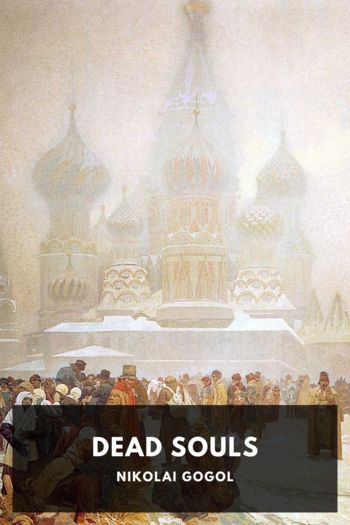Short Fiction - Nikolai Gogol (best selling autobiographies TXT) 📗

- Author: Nikolai Gogol
Book online «Short Fiction - Nikolai Gogol (best selling autobiographies TXT) 📗». Author Nikolai Gogol
“I am going!” said the Cossack, standing still. “I am going. What do I care about the headman? He thinks because he is the eldest, and throws cold water on people, and carries his head high. As to being headman—I myself am a headman. Yes indeed—otherwise—” As he spoke, he stepped up to the door of the first cottage he came to, stood at the window, drumming with his fingers on the glass, and feeling for the door-handle. “Woman, open! Woman, open quickly I tell you! It is time for me to go to sleep!”
“Where are you going, Kalenik? That is the wrong house!” some young girls who were returning from the dance called to him as they passed. “Shall we show you yours?”
“Yes, please, ladies!”
“Ladies! Just listen to him!” one of them exclaimed. “How polite Kalenik is! We will show you the house—but no, first dance before us!”
“Dance before you? Oh, you are clever girls!” said Kalenik in a drawling voice, and laughing. He threatened them with his finger, and stumbled, not being able to stand steadily. “And will you let yourselves be kissed? I will kiss the lot.” With tottering steps he began to run after them.
The girls cried out and ran apart; but they soon plucked up courage and went on the other side of the road, when they saw that Kalenik was not firm on his legs.
“There is your house!” they called to him, pointing to one which was larger than the rest, and which belonged to the village headman.
Kalenik turned towards it, and began again to revile the headman.
But who is this headman to whose disadvantage so much has been said? Oh, he is a very important person in the village. Before Kalenik reaches his house, we shall doubtless find enough time to say something about him. Everyone in the village takes off his cap at the sight of him, and even the smallest girls wish him good morning. Which of the young Cossacks would not like to be a headman? The headman has an entry everywhere, and every stalwart rustic stands respectfully, cap in hand, so long as the headman feels round his snuffbox with his thick, coarse finger. In parish-meetings and other assemblies, although his power may be limited by the votes of the majority, the headman still maintains the upper hand, and sends whom he chooses to make roads or dig ditches. In outward manners he is morose and severe, and not fond of talking. Long ago, when the Empress Catherine of blessed memory journeyed to the Crimea, he was chosen as one of her escort for two whole days, and had the high honour of sitting with the imperial coachman on the box.
Since then the headman has formed the habit of shaking his head solemnly and thoughtfully, of stroking his long, drooping moustache, and of darting hawk-like glances from his eyes. Whatever the topic of conversation may be, he manages to refer to his having accompanied the Empress, and sat on the box of the imperial coach. He often pretends to be hard of hearing, especially when he hears something that he does not like. He has an aversion for dandies, and himself wears under a black caftan of cloth, made at home, a simple, embroidered, woollen waistband. No one has seen him wear any other dress except, of course, on the occasion of the Czarina’s journey to the Crimea, when he wore a blue Cossack’s uniform. Hardly anyone in the village remembers that time, and he keeps the uniform packed up in a chest.
The headman is a widower, but his sister-in-law lives with him. She cooks his dinner and supper, keeps the house and furniture clean, weaves linen, and acts as housekeeper generally. The village gossips say that she is not a relation of his; but we must remark that the headman has many enemies who spread all kinds of slanders about him. We have now said what we considered to be necessary about the headman, and the drunken Kalenik is not yet halfway to his house. He continued to abuse the headman in terms which might be expected from one in his condition.
III An Unexpected Rival—The Conspiracy“No, you fellows, I won’t. What is the good of all those silly goings-on? Aren’t you tired of these foolish jokes? People already call us good-for-nothing scapegraces. Better go to bed!” So Levko said one evening to his companions, who were trying to persuade him to take part with them in further practical jokes. “Farewell, brothers! Good night!” he said, and left them with quick steps.
“Does my bright-eyed Hanna sleep?” he thought as he passed the house shaded by the cherry-trees. Then in the silence he heard the sound of a whispered conversation. Levko stood still. Between the trees there glimmered something white. “What is that?” he thought, as he crept closer and hid himself behind a tree.
By the light of the moon he saw the face of a girl standing opposite him. It was Hanna. But who was the tall man who had his back turned to him? In vain he strained his eyes; the whole figure was hidden in shadow, and the slightest forward step on Levko’s part would expose him to the risk of discovery. He therefore leant quietly against the tree, and determined to remain where he was. Then he heard the girl utter his name distinctly.
“Levko? Levko is a baby,” said the tall man in an undertone. “If I ever find him with you, I will pull his hair.”
“I should like to know what rascal is boasting of pulling my hair,” said Levko to himself, stretching out his head and endeavouring to miss no word. But the stranger continued to





Comments (0)